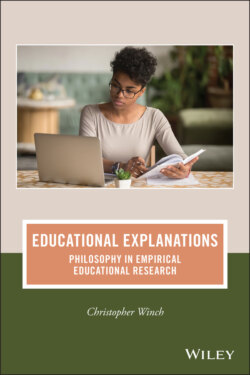Читать книгу Educational Explanations - Christopher Winch - Страница 32
All We Need Is Commonsense
ОглавлениеOne common response from EER sceptics is that it can tell us nothing that we could not know from the exercise of common sense (e.g. Barrow in Barrow and Foreman-Peck 2005, for similar ideas see O’Hear 1988). At best, EER simply tells us what we know through commonsense – it is often little more than tautologous (White 1997). But ‘common sense’ can mean different things, some of them uncontroversial, others much more contnroversial. At one level common sense refers to basic practical rationality (do not run in front of oncoming traffic; make sure that you eat properly) and the certainties in action that undergird practical rationality (Wittgenstein 1969).17 At another level it can refer to our unreflective conceptual grasp, before we step back to theorise or philosophise (Wittgenstein 1969; Gasparatou 2009). It can also mean the disposition to abide by evidence and advances in knowledge (a part of what Gramsci 1971 calls ‘good sense’ 1971, pp. 631–634).
But it can also mean unreflectively held beliefs which may have a possibly unknown provenance but which guide action (what Burke 1790 calls ‘prejudice’). These beliefs concern the characteristics of groups of people or of nationalities but also and crucially for us include quasi-normative guides to action, such as the view that homework is always a good thing for children to do. Normative, because such a view is taken as a professional maxim, but quasi because it is supposed to be based on evidence which is usually the experience of the person making the normative utterance. Finally, ‘common sense’ can refer to the ability to make appropriate situational judgements. It hardly needs saying that this sense of ‘common sense’ indicates an ability indispensable for teachers. But it is sometimes confounded with the quasi-normative sense of the term.
This is important as teachers need not only powers of situational judgement but also the ability to act on the basis of empirical evidence. If this evidence can be concentrated into a form of instinctive judgement as Burke suggests, then it is a potentially powerful professional tool. Unfortunately, however, the very scepticism that the advocate of common sense deploys against EER can justifiably be directed with even more force at the deliverances of this form of common sense. To see this, consider a famous quotation from Keynes concerning the ‘common sense’ of businessmen:
Practical men, who believe themselves to be quite exempt from any intellectual influences, are usually the slaves of some defunct economist. Madmen in authority, who hear voices in the air, are distilling their frenzy from some academic scribbler of a few years back. (Keynes 1936, p. 383)
Quite independently, Gramsci had developed a similar account of how beliefs developed in ‘high culture’ or within science or systematic enquiry come to be distilled and often distorted into a form of folk belief. Like Keynes, he thought that far from being a sure guide to action, such beliefs were often irrational. Thus he writes of common sense that
its most fundamental characteristic is that it is a conception which, even in the brain of one individual, is fragmentary, incoherent and inconsequential, in conformity with the social and cultural position of the masses whose philosophy it is. (Gramsci 1971, p. 419)
The thought of both Gramsci and Keynes is that there is a sedimentation of ideas based on philosophical, theoretical or scientific thinking. These ideas or theories may be true or false. But as they are sedimented in the circles of the non-philosophical, non-theoretical or non-scientific they become fragmented and lose coherence. Their influence is often uneven. Thus if they are congruent with the prejudices (in Burke’s sense) of a particular group, they can become underpinnings for those very prejudices and any critical appraisal of the evidence or presuppositions on which they are based is not even regarded as an option.
How are these considerations relevant to the EER sceptic? One version of the EER sceptic prides himself on the primacy of common sense and the irrelevance of EER. But he cannot deny that the practice of EER takes place and that its results are disseminated and often influential. The provenance of beliefs that may have had an origin in EER are often dimly, if at all, understood. The history of EER over the last century is full of examples of the assumptions and results of EER which have contributed to popular and professional belief about educational potential and achievement: IQ theory, developmental theories, verbal deficit theories and psycholinguistic accounts of how children learn to read and write – to name but a few of the more prominent of these.
Thus, EER has a powerful (and often malign) effect on educational practice through a dysfunctional mode of dissemination into the profession. Craft theories of teaching (Winch, C. 2017) are particularly susceptible as they rely so heavily on an uncritical and untheorised conception of common sense which fails to separate out the various elements described above.
The conclusion of this part of the discussion is that the advocate of EER scepticism has completely undermined the ground on which he stands by failing to take account of the fact that even if EER is ignored and dismissed as irrelevant it often re-appears in the often incoherent but strongly held views of teachers. The result of this is that ‘craft knowledge’ ends up having a profound and undesirable effect on educational practice through being a distorted and partial version of a theory which may well not have been true in the first place.
